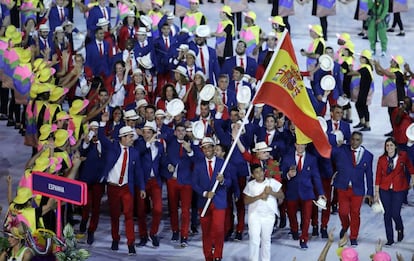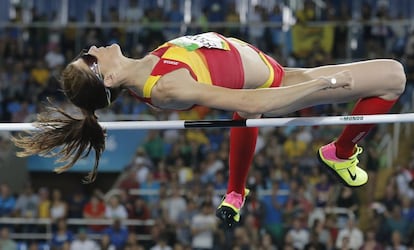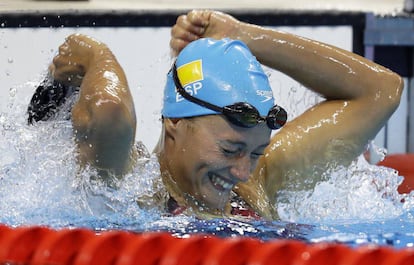A late finish in Rio earns Team Spain a place in the history books
Despite limited resources, Spanish Olympians showed their mettle, taking seven gold medals


In a final flurry at the Rio Games, culminating in 17 medals in total, the 306 members of Team Spain return home from Brazil heads held high, prompting more than one commentator to suggest that the country’s fractious and short-sighted politicians could learn something from a side that, with limited resources but a lot of will power and by working together, has made history.
Despite sharp funding cuts, Spain’s athletes return from Rio with seven gold medals, the country’s biggest tally since the 1992 Barcelona Games, as well as four silver and six bronze.
And it has been precisely in those two characteristically Olympian sports – track and field and swimming – where Spain struck gold, thanks to two remarkable women: Ruth Beitia and Mireia Belmonte.
With a far smaller budget than wealthier rivals and neighbors like France or Italy, and which have a much longer Olympic tradition, Spain won just one less gold than Italy or Australia
Spain’s female athletes have arguably been the stars of this year’s Games, breaking important barriers: four of the gold medals were won by women. Mireia Belmonte is the first female Spanish swimmer to win gold, in the 200 meters butterfly. As well as taking two bronze medals in the 200-meter freestyle, Belmonte took Spain’s first medal on August 7, the second day of the Games, coming third in the 400m individual medley event. On August 11, she took her first Olympic gold.

Meanwhile, Ruth Beitia won Spain’s first Olympic gold medal in women’s athletics when she took the Rio high jump title to claim her first global outdoor crown at the age of 37 on Saturday.
The three-times European champion cleared 1.88m, 1.93m and 1.97m the first attempt and became the oldest Olympic champion in the jumps on countback when all four remaining athletes failed to get over two meters.
Hopes were high from the start that Carolina Marín would take gold in badminton, and she confidently met expectations, becoming the first westerner to win Olympic gold in a sport historically dominated by Asia.
On Friday, Marin once again showed the character, technique, strength and overall ability that make her the world’s top-ranked player in her come-from-behind win over her Indian opponent, who won the first game in 27 minutes with three smashes in the final four points.

Spain’s women’s basketball side lost Saturday night’s final to the United States 72-101 but it too enters the history books by winning the first Olympic medal for Spanish women’s basketball.
Spain’s silver was their first Olympic medal of any color in women’s basketball. Spain’s Alba Torrens scored a game-high 18 points, but the United States were comfortable winners, leaving coach Geno Auriemma in tears.
Spain’s female athletes have arguably been the stars of this year’s Games, breaking important barriers
In end, the women’s team did better than their male colleagues: The United States men’s basketball side defeated the team that many felt would be their toughest opposition of the Olympics, beating Spain 82-76 in the semifinals on Friday. The United States led the game from the beginning, although it never fully shook Spain off until the waning moments.
Spain did well on the water, enjoying a successful run in canoeing that kicked off when Maialen Chorraut won Spain’s second gold in the 1,000-meters kayaking slalom, making her the first Spanish woman to win a medal after having had a child.
Two days later, Marcus Cooper Walz took gold in the 1,000 meters sprint, followed by the duo of Saul Craviatto and Cristian Toro, who took the top prize in the 200-meter sprint.
On August 13, Nadal and López beat Romania’s Horia Tecău and Florin Mergea in the men’s doubles to take Spain’s third gold.

With a far smaller budget than wealthier rivals and neighbors such as France or Italy, and which have a much longer Olympic tradition, Spain won just one less gold than Italy or Australia, whose overall medal haul was twice the size of Spain’s; France took 10 golds, but almost three times as many medals in total. It came 14th in the gold medal ranking, and 16th overall: the United States came first, with 121 medals, China won 70, and the United Kingdom 67.
English version by Nick Lyne.
Tu suscripción se está usando en otro dispositivo
¿Quieres añadir otro usuario a tu suscripción?
Si continúas leyendo en este dispositivo, no se podrá leer en el otro.
FlechaTu suscripción se está usando en otro dispositivo y solo puedes acceder a EL PAÍS desde un dispositivo a la vez.
Si quieres compartir tu cuenta, cambia tu suscripción a la modalidad Premium, así podrás añadir otro usuario. Cada uno accederá con su propia cuenta de email, lo que os permitirá personalizar vuestra experiencia en EL PAÍS.
¿Tienes una suscripción de empresa? Accede aquí para contratar más cuentas.
En el caso de no saber quién está usando tu cuenta, te recomendamos cambiar tu contraseña aquí.
Si decides continuar compartiendo tu cuenta, este mensaje se mostrará en tu dispositivo y en el de la otra persona que está usando tu cuenta de forma indefinida, afectando a tu experiencia de lectura. Puedes consultar aquí los términos y condiciones de la suscripción digital.








































